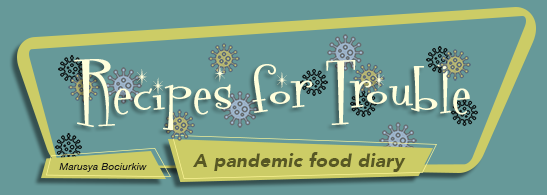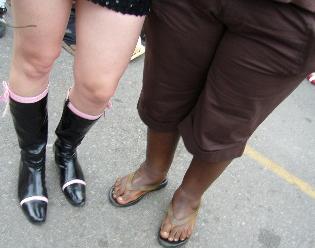Thoughts on Queer Culture, Writing, Feminism and Transgender
There was something rather charming about Toronto’s first-ever queer literary festival. I don’t know if it was the perfectly jagged mohawk of Jon, one of the organizers, or the excellent warm-but not-too warm weather. Or perhaps it was simply that, as my companion for that day, The Queer Organizer quipped, “It’s like a mini-Pride day!”
I heard some new writers, like Nairne Holtz – writing with a low-key, dry yet loving humour, and Michael Rowe – earnest and au courant. I listened to a panel of writers, editors and booksellers mouth cliches about queer writing and I went to a smut reading that was utterly un-sexy. I ran into old and new friends, ate eggs florentine on a sunny patio, did a reading, signed books, chatted with readers and writers. I had a lot of conversations with younger queers – a significant part of my readership, as it turns out! – and one of the things we talked about was the troubled relationship of feminism to transgender politics, in the wake of Patrick Califia‘s reading that morning.
Formerly Pat Califia, he (then she) has had an enormous impact on my life and writing. Califia was writing about sex at a time when that wasn’t, er, uh, the thing to do, and, during the reading, he made frequent and somewhat bitter references the “the feminists” that had stood in his way. Odd that, because it was a lesbian feminist publisher, Naiad Press, that bravely published his first book, Sapphistry: The Book of Lesbian Sexuality, in 1980. In it, Califia wrote, “Knowing I was a lesbian transformed the way I saw, heard, perceived the whole world […] We share a rebellious passion for the disinherited one, woman.”
The thing is, Califia wasn’t the only one writing so courageously and honestly. Feminists of all stripes were taking on a culture’s erotophobia and writing words or producing images that rocked the worlds of readers and audiences in the 70’s and 80’s, straight and queer alike. In Canada, there were video artists and filmmakers like myself, as well as Corrie Weingarden, the Kiss ‘n Tell Collective, Lynn Fernie, and writers and theorists like Mariana Valverde, Dionne Brand, Carolyn Gammon, Betsy Warland, Nicole Brossard. The American list of sex-positive feminists writers and theorists reads like an elegy: Annie Sprinkle; Audre Lorde: Joan Nestle; Sarah Schulman; Cheryl Clarke. The holy names of all these artists span my bookshelves; their words have marked my life. They made survival, and better yet, growth and expansion, possible for generations of queer feminists.
Why then, does Califia (much like other transmen that I’ve heard or read) define himself so singularly, and so in opposition to feminism? It’s certainly true that identity is relational, and that we often define ourselves by what we’re not – Canadian because we’re not American, queer because not straight, and so on. Sometimes that kind of identity formation can be the sign, as in Canadian identity, of a problem: a crack in the facade of national identity.
Identity itself is so fragmented, so multi-faceted. Defining yourself as just one thing – say, in my case, Ukrainian – would, of necessity require denying queerness, and probably feminism too.
Could it be that transgender politics is in an early kind of postcolonial nationalist stage? Something akin to the ‘lesbian nation’ of the 1970’s?
Still, I expect more from folks like Califia, who are old enough to remember the pain and pitfalls of essentialist identity politics. A fellow writer and ally, I don’t want to be lectured and stereotyped as I sit in the audience. I love Califia’s sex writing, admire his craft, appreciate his charm. I think he needs a good editor. Or maybe as audiences and readers, we need to be more outspoken.
I did, however, enjoy seeing straight couples, out for a stroll, pause by the tent where Califia was reading. I watched their expressions go from a pleasurable tolerance to something more bemused and unsettled.
And I thought, that’s the crux of it, really. To paraphrase Joan Nestle, “being a sexual people is our gift to the world.”





Sexy Lesbian Fruit Salad Spell (Vintage 80’s)
3 ripe mangoes, chopped on the diagonal for polyamourous flights of fancy
2 ripe papayas, for random flirtations that end in a lusty encounter
1 ripe honey dew melon for the tentative cuddle partners
1 star fruit thinly sliced for eroticly perfumed dreams
Marinate in a large see through bowl in lime juice, vanilla and amaretto
Serve at room temperature immediately, or on Hagen-Daas Vanilla Ice Cream in the fanciest dishes
Thank you for sharing!
Why then, does Califia (much like other transmen that I’ve heard or read) define himself … so in opposition to feminism?
It may have something to do with the fact that a lot of feminists – and, importantly, several of the more vocal ones, have defined feminism as being opposed to trans folk (men and women alike), insisting that accepting trans folk as genuine means abandoning the conception of gender as a social construct.
It’s what SnowDropExplodes says above: A significant number of feminist writers have made it clear that feminism stands in opposition to trans people and uses a vast spectrum of excuses as to why trans people aren’t genuine ranging from the idea that accepting trans people means abandoning the conception of gender as a social construct to all kinds of offensive characterizations and stereotypes that are used to dismiss and belittle trans people.
Transphobic feminists discuss trans people in the same way that the religious right discusses LGBT people. Exactly the same way. The language is identical, even if the underlying beliefs used to justify that language differs.
That’s why – Patrick was taking actual prejudice against people like him personally. And why shouldn’t he?
What a sexy blog, love the theme, what are you using?
Reading this reminds me of my old room mate. That guy was one of the smartest characters I know, but he was a little beatnik for my tastes though. Anyways I liked reading this, thanks. Will give me something to go into when I see him.
i’m regularly bouncing across the net almost all of the working day therefore I choose to peruse an awful lot, which isnt commonly a good thing as almost all of the web sites I see are composed of pointless trash copied from similar internet websites a thousand times, nonetheless I have to give you credit this page is genuinely enjoyable and also has a bit of unique material, therefore thank you for smashing the phenomena of exactly duplicating other individual’s blogs and forums, in case you ever want to have fun with playing a few hands of zynga poker with me just shout out – you have my email address :)